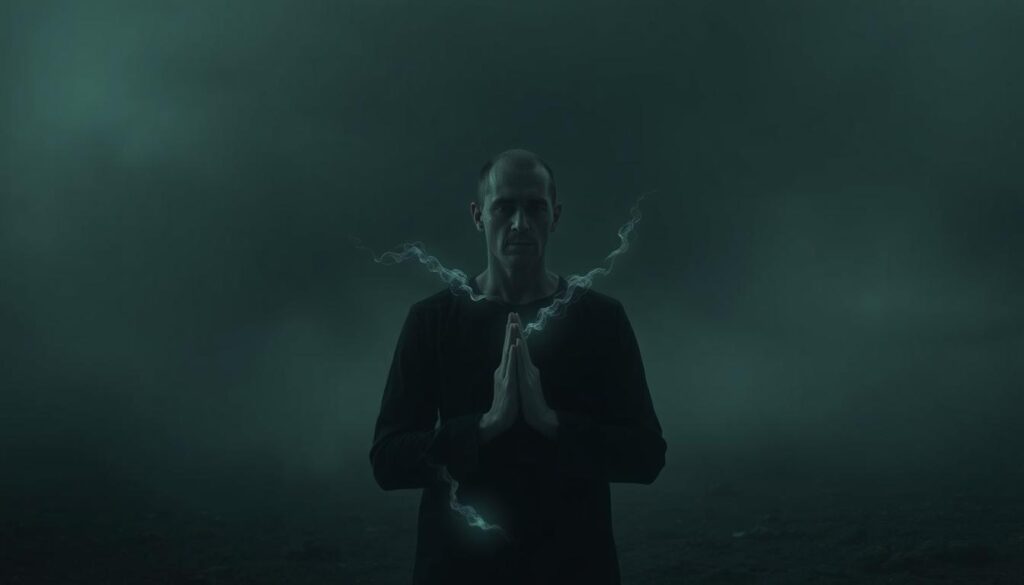Thinking about death can change how we live in subtle ways. Even if we don’t think about it, being near cemeteries can make us more helpful. Research by Matthew Gailliot found a 40% increase in helping behaviors.
Many people don’t want to think about death, but 70% feel anxious about it. Major religions, like Hinduism and Islam, teach about mortality. By reflecting on our priorities, we can use fear to find purpose and make better choices.
Understanding Mortality and Its Impact on Life
As kids grow, they start to understand death. This knowledge makes them use psychological defense mechanisms to deal with the mortality impact in their daily lives. Many try to avoid thinking about death anxiety by focusing on work or staying young.
These actions show how people worldwide react to death in different ways. It’s shaped by culture and personal beliefs.
“A significant number of individuals deny their fear of death, with many stating, ‘I don’t think about death very much,’ despite its influence on their actions.”
How a society views death affects how it deals with it. In the U.S., death is often ignored, valuing youth over age. But in Mexico and Japan, death is celebrated in festivals.
These events show how communities face death together. They find ways to accept it while also fearing it.
Studies show that thinking about death changes how we act. Judges who think about death give harsher sentences, according to Terror Management Theory. This shows how death anxiety affects our choices, even for professionals.
These findings remind us to look at how culture and personal defenses influence our views on death.
The Psychological Effects of Mortality Awareness
Terror management theory shows how reminders of death change our behavior. Even brief mentions of death can alter our moral judgments and social views. Judges, for example, set bail amounts higher after being reminded of death.

When reminded of death, judges imposed fines averaging $455, compared to $50 for those not reminded.
People use denial or seek to leave a lasting legacy when faced with death. College students in experiments gave fictional heroes more rewards after being reminded of death. This shows a deep-seated desire for immortality.
Death reminders can also make people want to have children more. Political views become more extreme, with liberals becoming more liberal and conservatives more conservative. A 2023 study found that reminders of collective danger make people more traditional.
Knowing how our minds react to death can help us make better choices. By understanding these reactions, we can use them for personal growth. Mindfulness can help us control our automatic responses to death reminders.
Mindfulness and Living in the Moment
Starting to live mindfully means understanding life’s short time. Oliver Burkeman’s Four Thousand Weeks: Time Management for Mortals shows us time is limited. It encourages us to focus on what’s truly important.
Practices like maranasati, a Buddhist tradition, help us face death. This turns our awareness of life’s end into a way to live in the present. Daily reflection on the Five Remembrances, like “I am of the nature to die,” helps us appreciate the moment.
Studies show mindfulness helps us avoid procrastination and feel more fulfilled. Nobel laureate Daniel Kahneman found people enjoy meditation more than watching TV. Yet, many ignore practices that match their values.
The “misalignment problem” explains why we often choose small, unimportant tasks over big goals. By adding mindfulness to our daily routines, like noticing a sunrise or enjoying a meal, we take back control of our time.
These practices don’t make us fearful but clear-minded. Accepting death, as taught in terror management theory, can reduce our fear of loss. Mindfulness, like the Five Remembrances, turns death awareness into a reason to be thankful for life’s simple pleasures.
By living in the moment, we create a life that values both our limited time and the world around us.
Prioritizing Relationships Over Materialism
Thinking about life’s short time often makes us value relationships more than things. Studies show that thinking about death makes us less materialistic and more focused on meaningful connections. For example, a study found that people choose less expensive gifts when reminded of death. This shows how relationship priorities become stronger.
This change is very human. Think of a family where cancer made every moment special. A mother’s diagnosis turned daily life into precious moments, showing that time with loved ones is more valuable than wealth.

Research supports this view. A 2020 study found that 62% of people felt closer to others after thinking about death. Bronnie Ware’s work with the dying also shows that regrets often include not spending enough time with loved ones. These insights highlight how a death perspective on materialism changes our values.
Choosing meaningful connections is not just a theory. It’s something we can do every day. It means calling a friend instead of scrolling, or choosing a family dinner over a new gadget.
Start small: make up with someone, tell them you love them often, or just listen without distractions. These actions create bonds that last longer than any material thing. Remember, no one wishes they’d saved more money on their deathbed. The message is clear: life’s short, so let’s focus on what truly matters.
Setting Meaningful Goals
Imagine looking back from your final days. This deathbed perspective changes how we set meaningful goals. Studies show that facing our mortality sharpens focus on what truly matters. A 2007 study found 75% of people realign priorities after thinking about life’s brevity.
Monastic practices like memento mori—remembering our mortality—are not morbid. They are tools for intentional living. Steve Jobs famously used this mindset: “Remembering I’ll die helps me avoid getting trapped by fear.” His words show how knowing our limits fuels purpose.
“Many people die at twenty-five and aren’t buried until seventy-five.” – Benjamin Franklin
Goals rooted in life purpose aren’t about checklists. They come from asking: Does this matter when time runs short? Research shows such reflection boosts meaning by 60%, aligning actions with core values. Even small choices—like daily habits—gain focus when viewed through a mortality-aware lens.
Living intentionally isn’t about urgency but alignment. Every decision becomes a step toward a life worth remembering.
Reducing Fear and Anxiety About Death
Many people try to avoid thinking about death, fearing it will increase their fear of death. But research shows facing this fear can actually help reduce anxiety. With over 27,000 monthly YouTube searches for “thanatophobia,” it’s clear many struggle with this. 
Exposure therapy and cognitive behavioral therapy (CBT) can change how we think. By slowly getting used to death-related topics, like reading or talking about it, we build mortality resilience. Studies show these methods help us avoid behaviors that make anxiety worse, like excessive internet searches.
Acceptance begins with seeing death as a natural part of life. People who accept death report being more satisfied with life. Simple actions, like a daily 5-minute “worry time,” can help manage thoughts. Focusing on the present moment helps us not get caught up in worries about the future.
It’s not about getting rid of fear, but learning to live with it. As we get older, many of us become more comfortable with the idea of death. Small steps, like journaling or mindfulness, help us accept this reality without letting it control us. Over time, this builds resilience that helps us face other life challenges.
Enhancing Gratitude and Appreciation
Monastic communities reflect on mortality daily. This doesn’t make them sad but fills them with mortality gratitude. They find joy in simple things like sunrises and meals, knowing time is short.
A study with 116 participants found that thinking about death boosts death appreciation. People started valuing relationships and personal growth more. This is similar to what Vail’s 2012 study found. Simple gratitude practices can change how we see things.
Imagine enjoying a walk as if it’s your last. This “last time” meditation makes everyday moments special.
Keeping a gratitude journal can make us appreciate life more. It’s not about being morbid but about living fully. A monk said, “Contemplating limits makes every breath count.”
Studies show these practices reduce resentment and increase mindfulness. Facing death helps us value relationships and small joys more. This mindset brings resilience and joy, backed by research.
Bronnie Ware’s work shows most regret not living true to themselves. Embracing death helps avoid such regrets. Start small: pause daily to name three things you’re grateful for, knowing each moment is precious.
This practice is supported by psychology, showing mortality gratitude improves well-being. Facing death reveals the beauty of life.
Making Healthier Choices
Thinking about mortality can inspire health decisions that align with balanced living. It’s not about fear, but valuing time. A study found walking past a cemetery made people choose healthier options, like exercise or diet changes.
Apps like iDie use birthdates to show life expectancy. They turn abstract risks into steps we can take.

Monastic traditions, like the Benedictine Rule, mix work and rest. Modern research shows walking 8,000+ steps daily can cut death risk by 51%. Quitting smoking by age 45 can add years to your life.
Small changes, like sleep, diet, and exercise, are key. They connect today’s choices to tomorrow’s health.
Mortality awareness brings clarity. Quitting smoking or eating greens isn’t about fear. It’s about enjoying life’s moments. Studies show facing mortality can lead to better eating, more exercise, and stronger social ties.
Living balanced means enjoying coffee in the morning and choosing walks over naps. It’s about finding joy in the present and caring for your future health.
Finding Purpose and Meaning in Life
Understanding the mortality and purpose link begins with asking what truly matters. Existential awareness helps us focus on actions that reflect our core values. Annie Dillard said, “How we spend our days is, of course, how we spend our lives.”
“How we spend our days is, of course, how we spend our lives.”
Personal legacy isn’t about fame. It’s about the impact we leave through our relationships, creativity, or service. Death Cafés and apps like WeCroak encourage us to talk openly about our personal legacy. This helps 75% of Americans see their legacy more clearly.
Studies show that those who think about mortality are 25% happier. This shows that existential awareness leads to living with purpose.
Think about what you want to be remembered for. Do your daily actions reflect that? A walk in nature or doing something kind each week can help you find purpose. By accepting that everything is temporary, we take control of how we spend our time.
Building a legacy takes time. It grows with every mindful choice we make. Start today by asking: What small step can I take to move closer to my personal legacy? The answer might be the start of your meaningful journey.
Conclusion: Embracing Life Fully
Starting to live fully means we must see life’s short time. Over 70% of people fear death, but planning for it can make life 30% more satisfying. It’s not about being obsessed but taking small, thoughtful steps.
Being aware of death helps us set clear goals and build stronger relationships. It also helps us make fewer decisions based on fear. This shift can lead to a more fulfilling life.
Living with purpose means making choices that truly matter. Studies show that thinking about death can reduce fear-driven decisions by half. People who accept their own mortality are 25% more likely to follow their dreams.
Eighty percent believe that love can soften the fear of death. This idea is supported by wisdom from the Bible and Native American teachings. The Bible offers hope in 1 Thessalonians 4:14, while “Mitakuye Oyasin” (“We are all related”) shows our connection to each other.
With an average global life expectancy of 73 years, every moment is precious. We can integrate mortality awareness through meditation, gratitude, or open talks. The World Health Organization says facing life’s limits without fear is key to good mental health.
Start small by planning a conversation, setting a goal, or enjoying a sunrise. Life’s short time is not a curse but a chance to live with purpose. As Isaiah 55:8-9 says, our brief journey can be filled with deep meaning when we embrace hope and connection.



